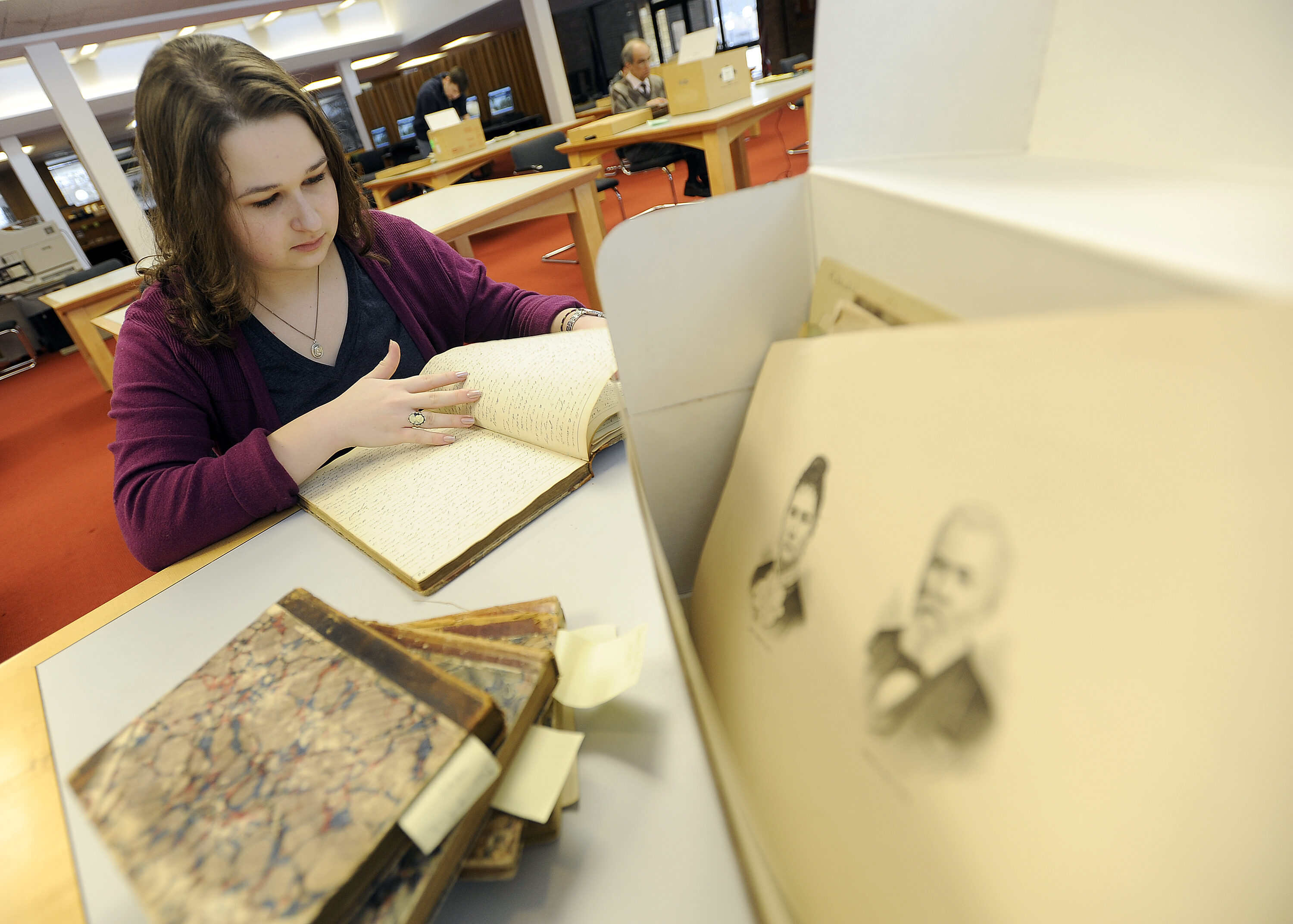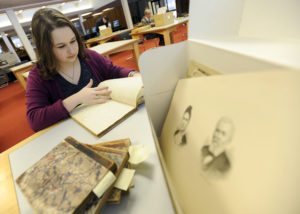
University of Michigan freshman researching George Pray journals at the Bentley Historical Library. Photo by Lon Horwedel
Those who have been around campus for some time may be familiar with names like Alice Crocker Lloyd, Robert P. Briggs and Margaret Bell, but until recently none of these important figures in University of Michigan history had biographies on the most popular contemporary list of who’s who in the world: Wikipedia.
Those omissions now have been fixed thanks to an assignment Terrence J. McDonald gave students in a special class he taught in winter on U-M history.
McDonald, director of the Bentley Historical Library and Arthur F. Thurnau professor of history, said the exercise represents the kind of deep dive into historical archives a new Third Century Initiative Transformation project will offer students through courses taught by teams of faculty and library archivists.

University of Michigan freshman researching George Pray journals at the Bentley Historical Library. Photo by Lon Horwedel
Engaging the Archives is one of six projects just funded under the $25 million Transforming Learning for the Third Century of the Third Century Initiative.
The 5-year, $833,000 grant will allow McDonald and colleagues to hire an academic archivist and assemble a team of 25 Bentley Faculty Fellows and four more archivists to help students experience the university’s vast historical resources on U-M and the State of Michigan in new ways.
Five new faculty fellows will be appointed beginning this fall, and five new courses will start in Fall 2016. New fellows and courses will be developed over the five years, eventually serving 1,500 students.
The goal is to encourage students to learn more about the primary historical sources than they typically get now coming into the library to gather a few facts for an assignment.
“When I was a student you did a research paper, it was graded and then it went in the trash,” he said. “It was astonishingly motivating when on launch day for the Wikipedia assignment they could go out on Google and read their pieces, and their families could see their work,” McDonald said.
“Making a student an expert in a topic is so powerful. It’s a new kind of engagement, very deep. They spend hours researching these subjects.”
Engaging the archives also is intended to foster engaged collaborations among faculty and archivists, as they work to develop new learning objectives, tools and analytics for use by students and faculty over the long term, the project proposal states.
“We have 65 classes that come to the Bentley but essentially they just come to us. What we will ask faculty to do is work with us in advance, let us think with them about how to deliver these materials that allow this additional exploration,” McDonald said.
In some cases that delivery may be in the form of digital materials that get included in a course pack, he said, something that will take time and planning, as currently only about 10 percent of the Bentley holdings are in digital form.
In addition to promoting student discovery of the archives, the proposal states that it will improve their historical thinking skills, increase their understanding of difference and tolerance, and promote active citizenship.
Another Transformation project that seeks to encourage citizenship will be expanded, following receipt of a $378,000 Transformation grant.
Citizen Interaction Design, a course to develop information tools such as apps, and web and social media sites to foster citizen engagement with government, has allowed School of Information students to impact the city of Jackson’s relationship with it citizenry.
Since the summer of 2013, students have been engaged with city leaders on 18 projects, including an anonymous police tip system, an open data policy, a campaign to encourage vaccine use, and various apps and websites that share information about cemeteries, art in the community, what’s happening at the local farmers’ market, progress on downtown development, a listing of distressed properties, and bus routes and times.
While CID allows students hands-on experience helping small cities that typically don’t have the budget to implement some of these programs, an overarching goal is to transform student thinking about what it is to be a citizen, and instill within them the importance of being part of their communities.
CID was supported with earlier Quick Wins/Discovery grant that allowed the course to be developed and a three-year relationship established with Jackson.
“The two main questions we’re asking thorough the next two phases: Can we replicate this in other cities and what can we do to make these meaningful experiences within the structure of the University of Michigan? “ said Cliff Lampe, associate professor of information.
Lampe said it’s been challenging to work within the university’s academic calendar, with ever-changing groups of students who have other classes to attend, and keep the momentum on the projects needed by a city that operates a regular work day, year-round, Monday through Friday.
The project has been a great success, however, such that he now hopes to expand it to other Michigan cities. He is looking at West Michigan and Northern Michigan, and has had preliminary discussions with Grand Rapids leaders.
“One of the nice things about going to a larger city like, say, Grand Rapids would be that we’ll have to figure out how to scale up, and learn what that would take. I also think we’re going to want to work in a smaller place than Jackson so we can figure out how to scale down,” he said.
“Every city has challenges. One of the aspects of this program is there is no utopian city that can’t use some of these same tools.”
His transformation plan also includes starting a network of universities and colleges interested in this work.


